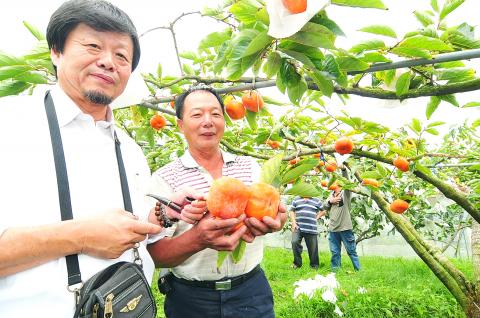After changing from betel nuts, 63-year-old farmer Chu Kuo-hsing (朱國興) now grows nationally renowned persimmons, acclaimed for their size and sweetness, at his farm in Taichung’s Heping District (和平).
Chu said he uses low amounts of planticides and fertilizers on his fruit trees, but his persimmons are both sweeter and bigger than the average fruit.
He said his secret is technical assistance from National Chung Hsing University agriculture and natural resources professor Tsay Tsung-tsuan (蔡東纂), who was introduced to Chu by the farmer’s elder brother.

Photo: Lee Chung-hsien, Taipei Times
Prior to becoming a successful persimmon farmer, Chu said he grew bamboo shoots and betel nuts with his parents near Taichung’s Dakeng (大坑) area and that he was a leading betel-nut farmer.
Chu said that a decade ago, he began to sense a contraction in the betel-nut market and decided to transition to persimmon farming.
Chu said he bought three jia (甲) of land (11.77 hectares) and started growing fruit trees right away, but with initially discouraging results.
In spite of spending more than NT$1 million (US$30,714) on fertilizer and weed killer each year, his fruits were “about the size of an egg,” Chu said, adding that his fruit became the butt of jokes in the farmer’s market where his persimmons were derided as “Chu’s little ones.”
Chu said he went to Tsay desperate for help, and the agriculturalist told him that he should drastically reduce his use of chemicals.
Chu reduced his fertilizer use by 90 percent and his persimmons became some of the best on the market, Chu said.
Chu’s persimmons measure 20 on the Brix sweetness scale and weigh between 9 and 15 liang (兩, a traditional unit of weight based on a lump of silver, the equivalent of about 37.5 grams), with the biggest fruits weighing up to 18 liang. The average persimmon on the market weighs between 6 and 9 liang.
Chu said that he sells 60 percent of his produce direct, and does not use retail venues. His fruit has no pesticide or weed killer residue and are sold for between NT$200 and NT$300, Chu said, adding that he is expecting a substantial rise in the market price of persimmons this year.

An essay competition jointly organized by a local writing society and a publisher affiliated with the Chinese Communist Party (CCP) might have contravened the Act Governing Relations Between the People of the Taiwan Area and the Mainland Area (臺灣地區與大陸地區人民關係條例), the Mainland Affairs Council (MAC) said on Thursday. “In this case, the partner organization is clearly an agency under the CCP’s Fujian Provincial Committee,” MAC Deputy Minister and spokesperson Liang Wen-chieh (梁文傑) said at a news briefing in Taipei. “It also involves bringing Taiwanese students to China with all-expenses-paid arrangements to attend award ceremonies and camps,” Liang said. Those two “characteristics” are typically sufficient

A magnitude 5.9 earthquake that struck about 33km off the coast of Hualien City was the "main shock" in a series of quakes in the area, with aftershocks expected over the next three days, the Central Weather Administration (CWA) said yesterday. Prior to the magnitude 5.9 quake shaking most of Taiwan at 6:53pm yesterday, six other earthquakes stronger than a magnitude of 4, starting with a magnitude 5.5 quake at 6:09pm, occurred in the area. CWA Seismological Center Director Wu Chien-fu (吳健富) confirmed that the quakes were all part of the same series and that the magnitude 5.5 temblor was

The brilliant blue waters, thick foliage and bucolic atmosphere on this seemingly idyllic archipelago deep in the Pacific Ocean belie the key role it now plays in a titanic geopolitical struggle. Palau is again on the front line as China, and the US and its allies prepare their forces in an intensifying contest for control over the Asia-Pacific region. The democratic nation of just 17,000 people hosts US-controlled airstrips and soon-to-be-completed radar installations that the US military describes as “critical” to monitoring vast swathes of water and airspace. It is also a key piece of the second island chain, a string of

The Central Weather Administration has issued a heat alert for southeastern Taiwan, warning of temperatures as high as 36°C today, while alerting some coastal areas of strong winds later in the day. Kaohsiung’s Neimen District (內門) and Pingtung County’s Neipu Township (內埔) are under an orange heat alert, which warns of temperatures as high as 36°C for three consecutive days, the CWA said, citing southwest winds. The heat would also extend to Tainan’s Nansi (楠西) and Yujing (玉井) districts, as well as Pingtung’s Gaoshu (高樹), Yanpu (鹽埔) and Majia (瑪家) townships, it said, forecasting highs of up to 36°C in those areas